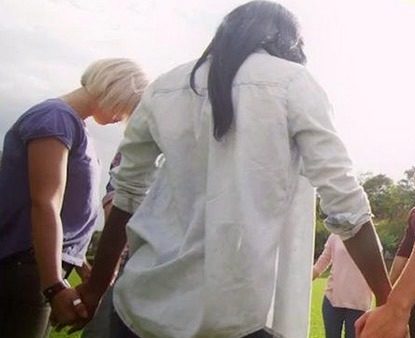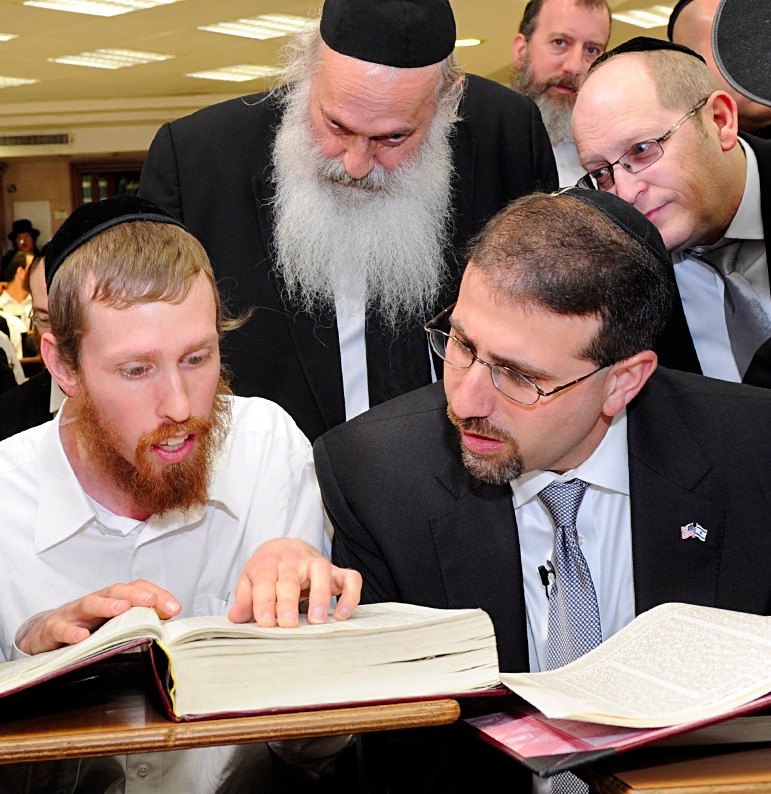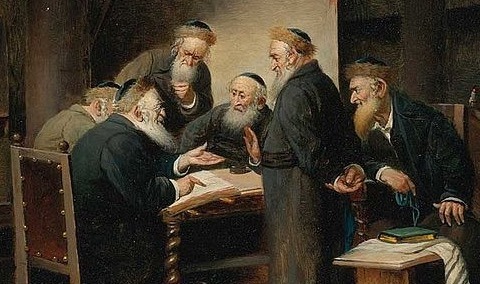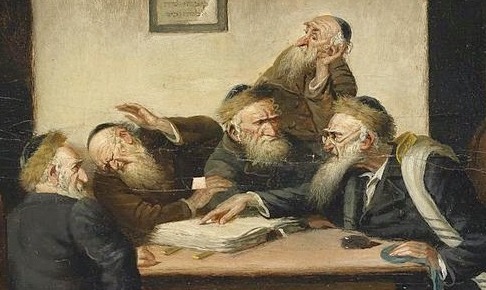I recently received a question about Jesus’ words in Matthew 18:20, “For where two or three are gathered in my name, there am I among them” which I discussed in my book Sitting at the Feet of Rabbi Jesus, page 72.
 Many read this line as meaning that Jesus promises to be present when his followers gather to pray for something “in his name.” In my chapter I pointed out the importance of gathering in community.
Many read this line as meaning that Jesus promises to be present when his followers gather to pray for something “in his name.” In my chapter I pointed out the importance of gathering in community.
One reader pointed out that this verse is located within Jesus’ teaching about making a decision regarding a sinner (Matt. 18:15-20). The “two or three who are gathered” could be witnesses to an offense. Is it OK to apply this line more broadly, or should we stick to a narrow interpretation, that Jesus acts as a “witness” when we are making a decision in a trial?
In Terms of Wider Rabbinic Thought
What is fascinating is to look at Jesus’ words in the context of wider rabbinic thought. Several sayings sound quite similar, like
“When two sit together and words of Torah pass between them, the Divine Presence rests between them” Mishnah Avot 3:3
“When three eat at one table and speak the words of Torah there, it is as though they have eaten from the table of God.” Mishnah Avot 3:4
“Whenever ten are gathered for prayer, there the Shekinah rests.” Talmud Sanhedrin 39 (The “Shekinah” refers to God’s presence made manifest in a glorious way.)
“When three sit as judges, the Shekinah is with them,” Talmud Berachot 6
Note that this last line is about God’s Shekinah being present even when people are judging, reminiscent of Jesus’ words. The other quotations are about Torah study or prayer. These two ideas overlap, actually. Rendering judgment requires a type of Scripture study, because rabbis were often asked to interpret the Torah in order to decide whether it had been broken or not.
There’s also a longer discussion about how many people are required for God’s presence to be among them:
Rabbi Chalafta ben Dosa (~100 AD) used to say: ‘If ten men sit together and occupy themselves with the Torah, the Divine Presence rests among them, as it is written (Psalm 82:1) “God has taken his place in the divine council.” And from where do we learn that this applies even to five? Because it is written (Amos 9:6) “And founds his vault upon the earth.” And how do we learn that this applies even to three? Because it is written (Psalm 82:1) “In the midst of the gods he holds judgment.” And from where can it be shown that the same applies even to two? Because it is written (Malachi 3:16) “Then those who revered the Lord spoke with one another. The Lord took note and listened.” And from where even of one? Because it is written (Exodus 20:24) “In every place where I cause my name to be remembered I will come to you and bless you.” Mishnah, Avot 3:4-7 *
I don’t think this discussion was intended to be a hard-edged theological proof about where God present and where he is not. Rather, it seems to be a sermonic exhortation to study, pray and decide matters of Bible interpretation in the presence of others.
The rabbinic discussion may be related to the fact that ten adults (a “minyan”) were required for communal prayers to be prayed. The rabbi seems to be saying that this doesn’t necessarily mean that God is only present when ten people come together. It quotes Scriptures that point out many places where humans assembled and God is in their midst.
The common denominator in all of these rabbinic statements is the presence of God being especially near when his people gather to meditate on how he wants them to live. This is really the central point of each one. Sometimes they are praying, but sometimes they are studying or judging a trial.
Jesus’ statement fits right in among them, and it sounds like his words about “two or three are gathered” have a very similar intention, stressing the idea of gathering and praying as a group in order to discern his will.
A Claim to Identity with God?
It’s fascinating to notice that while the rabbis were talking about God’s presence being near, Jesus was talking about his own presence. This is really quite surprising. The rabbinic quotations above were recorded in Jewish literature after the time of Christ (200 – 500 AD). Because of the hostility between Christians and Jews, it’s unlikely that later rabbis would have been expanding on a statement that Jesus was known to have made.
More likely, Jesus and other rabbis were both mediating on a line of Scripture that was seen as significant in early Judaism. I wonder if this might have been Exodus 20:24, which we read in the rabbinic discussion above:
In every place where I cause my name to be remembered I will come to you and bless you.
Consider how this compares to Matthew 18:20:
For where two or three are gathered in my name, there am I among them.
God promised his presence where ever “his name is remembered,” and Jesus promised to be present whenever people “gather in his name.”
 When you compare these two lines, it sounds like Jesus was equating his presence with that of the LORD. Christians are used to reading this into Jesus’ words, but to his original audience, that must have seemed quite galling, well beyond what was appropriate if Jesus was only a wise human teacher.
When you compare these two lines, it sounds like Jesus was equating his presence with that of the LORD. Christians are used to reading this into Jesus’ words, but to his original audience, that must have seemed quite galling, well beyond what was appropriate if Jesus was only a wise human teacher.
What’s fascinating is that Jesus’ words become all the more startling when you’re familiar with related rabbinic sayings about the Shekinah, even though they come from a slightly later time.
In the context of wider rabbinic thought, it sounds like Christ was hinting at identity with the God of Israel, and promising to personally reveal God’s will to all who earnestly seek him out.
~~~~~
(Paintings by Carl Schleicher – Wikipedia)


Bonnie Roerdink says
Lois, your article evoked praise to come forth to our great God who hears the prayers of His people. Thank you and God’s blessings upon you as you strive to touch the corner of His robe.
Cecil Cannon says
Your last paragraph nailed it.
Paul Wallace says
The Rabbinic quotes add so much to how it may have sounded in the ears of Jesus’ Jewish audience. I wonder if our use of it as needing two or three to have His presence isn’t diminishing the fact that His Holy Spirit lives within us. The application to prayerful judgment by searching the Scriptures seems most applicable. In that case you would want the counsel and leading of fellow believers.
Lois Tverberg says
A good word, Paul.
John says
I appreciate your insight to this. I previously thought this quote derived from the context of a disciplinary process in the church. I now see that it is not only homilectical but has an origin in a Jewish context.
EL MOHEL says
I was looking on Google play store in books.
I saw your book.
Reading the Bible with Rabbi Jesus.
So I wanted more information on the author.
Not many Christians would ever put
Rabbi and Jesus together.
Being a Mohel who believes in Yeshua “Jesus”
Thank you for your reaching out sharing your knowledge, understanding and being found in
Messiah Jesus His Wisdom.
Mohel
Tina Askins says
I am searching for answers about my Lord Jesus, I only want the about Jesus and is His presence also in the one in divisible? I know God’s spirit lives in me,that’s why I’m so thirsty for nothing but the truth…
Andrew says
I recently lost my mom and the words from Matthew 18:20 have come to mind a number of times for me. I am now an “orphan” so to speak (I have no other remaining close family). But, when I gather with friends of my mom, I feel as though my mom’s presence is with us in a way which it isn’t otherwise. It makes me ponder these words of Scripture: perhaps they were written by a grieving community who experienced much the same when they gathered and remembered. Perhaps, they backwrote it into their accounts of Jesus–its significance for them was so great. For me, it’s a marvelous experience and it feel like a blessing: to be able to gather, remember, and perhaps feel something of the parted one’s presence. Surely, this must be true for many who mourn the loss of someone very close to them.
At any rate, I appreciate your commentary and reflection. Thank you.